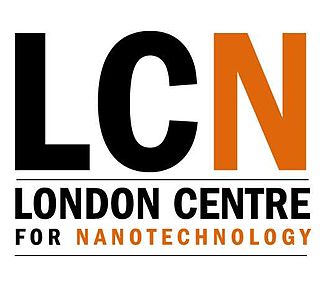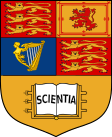
A ceramic is any of the various hard, brittle, heat-resistant and corrosion-resistant materials made by shaping and then firing an inorganic, nonmetallic material, such as clay, at a high temperature. Common examples are earthenware, porcelain, and brick.

Sheffield Hallam University (SHU) is a public research university in Sheffield, South Yorkshire, England. The university is based on two sites; the City Campus is located in the city centre near Sheffield railway station, while the Collegiate Crescent Campus is about two miles away in the Broomhall Estate off Ecclesall Road in south-west Sheffield.
The Doctor of Engineering, or Engineering Doctorate, is a degree awarded on the basis of advanced study and a practical project in the engineering and applied science for solving problems in the industry. In the United States, it is a terminal professional doctorate. A DEng/EngD is equivalent to a PhD in engineering, but different in that it has a solid industrial base and an additional taught element. The degree is usually aimed toward working professionals.

Ceramic engineering is the science and technology of creating objects from inorganic, non-metallic materials. This is done either by the action of heat, or at lower temperatures using precipitation reactions from high-purity chemical solutions. The term includes the purification of raw materials, the study and production of the chemical compounds concerned, their formation into components and the study of their structure, composition and properties.

Khajeh Nasir al-Din Toosi University of Technology (KNTU), also known as K. N. Toosi University of Technology, is a public research university in Tehran, Iran. It is named after medieval Persian scholar Khajeh Nasir Toosi. The university is considered one of the most prestigious institutions of higher education in Iran. Acceptance to the university is highly competitive, entrance to undergraduate and graduate programs typically requires scoring among the top 1% of students in the Iranian University Entrance Exam.

The London Centre for Nanotechnology is a multidisciplinary research centre in physical and biomedical nanotechnology in London, United Kingdom. It brings together three institutions that are world leaders in nanotechnology, University College London, Imperial College London and King's College London. It was conceived from the outset with a management structure allowing for a clear focus on exploitation and commercialisation. Although based at UCL's campus in Bloomsbury, the LCN includes research in departments of Imperial's South Kensington campus and in King's Strand campus.
CSA was a division of Cambridge Information Group and provider of online databases, based in Bethesda, Maryland before merging with ProQuest of Ann Arbor, Michigan in 2007. CSA hosted databases of abstracts and developed taxonomic indexing of scholarly articles. These databases were hosted on the CSA Illumina platform and were available alongside add-on products like CSA Illustrata. The company produced numerous bibliographic databases in different fields of the arts and humanities, natural and social sciences, and technology. Thus, coverage included materials science, environmental sciences and pollution management, biological sciences, aquatic sciences and fisheries, biotechnology, engineering, computer science, sociology, linguistics, and other areas.

MTS Systems Corporation (MTS) is a global supplier of test systems and industrial position sensors. The company provides test and measurement products to determine the performance and reliability of vehicles, aircraft, civil structures, biomedical materials and devices and raw materials. Examples of MTS products include: aerodynamics simulators, seismic simulators, load frames, hydraulic actuators and sensors. The company operates in two divisions: Test and Sensors.

Uma Chowdhry is an American chemist whose career has been spent in research and management positions with E. I. du Pont de Nemours and Company. She has specialized in the science of ceramic materials, including catalysts, proton conductors, superconductors and ceramic packaging for microelectronics.

The American Ceramic Society (ACerS) is a non-profit professional organization for the ceramics community, with a focus on scientific research, emerging technologies, and applications in which ceramic materials are an element. It is located in Westerville, Ohio.
As an important part of the national sustainable development strategy, the development of advanced materials is advancing the competitive nature and state of the art for Chinese industry. The State has put advanced materials high on its development agenda for the next decade and listed it among the key high-tech industry sectors that would be given priority for development by the State Council. At present, the pace of building China's advanced materials industry is accelerating. Advanced materials have been key fields in China's national R&D system.
Anthony Glyn Evans was Alcoa Professor of Materials, professor of Mechanical Engineering, director of the Center for Multifunctional Materials and Structures and co-director for the Center for Collaborative Engineering Research and Education at the University of California, Santa Barbara, United States.
The A. A. Griffith Medal and Prize is awarded annually by the Institute of Materials, Minerals and Mining in commemoration of Alan Arnold Griffith.
Chaitanyamoy Ganguly is an Indian nuclear scientist and a former head of the Nuclear Fuel Cycle and Materials Section of the International Atomic Energy Agency (IAEA), credited with many innovations in the field of nuclear material science. He was honored by the Government of India, in 2002, with the fourth highest Indian civilian award of Padma Shri.

The Henry Royce Institute is the UK’s national institute for advanced materials research and innovation. Its vision is to identify challenges and to stimulate innovation in advanced materials research to support sustainable growth and development. Royce aims to be a "single front door" to the UK’s materials research community. Its stated mission is to “support world-recognised excellence in UK materials research, accelerating commercial exploitation of innovations, and delivering positive economic and societal impact for the UK.”

Nicole Grobert FRSC FYAE is a German-British materials chemist. She is a professor of nanomaterials at the Department of Materials at the University of Oxford, fellow of Corpus Christi College, Oxford, and a Royal Society industry fellow at Williams Advanced Engineering. Grobert is the chair of the European Commission's Group of Chief Scientific Advisors.

The Department of Mechanical Engineering is responsible for teaching and research in mechanical engineering at Imperial College London, occupying the City & Guilds Building at the South Kensington campus. The department has around 45 faculty members, 600 undergraduates, and 250 postgraduate students. The department ranks 8th in the QS World University Rankings's 2018 table.

The Department of Materials is responsible for the teaching and research in materials science and engineering at Imperial College London, occupying the Royal School of Mines and Bessemer buildings on the South Kensington campus. It can trace its origins back to the metallurgy department of the Government School of Mines and Science applied to the Arts, founded in 1851.
Allan Matthews (1952) is Professor of Surface Engineering and Tribology at The University of Manchester and Director of the Digitalised Surfaces Manufacturing Network.
The Faraday Institution is a British research institute aiming to advance battery science and technology. It was established in 2017 as part of the UK's wider Faraday Battery Challenge. It states its mission as having four key areas: "electrochemical energy storage research, skills development, market analysis and early-stage commercialisation". The Institution is headquartered at the Harwell Science and Innovation Campus near Oxford. It is a limited company and is a registered charity with an independent board of trustees.













